Boston Terrier
Wojciech Kozielczyk/iStock / Getty Images Plus via Getty Images
Boston Terriers originated in Boston (hence their name) and are affectionately known as the “American gentleman” because of their good manners and dapper tuxedo coat that’s commonly black and white (though, there are also brindle Boston Terriers).
A Boston Terrier’s behavior can be quite rambunctious, and the dogs like to participate in whatever their family is doing. Although they have a lot of energy, Boston Terriers are happy with consistent-yet-moderate exercise and thrive in many environments, including as apartment dogs.
The Boston Terrier’s size is small; the dogs have a shoulder height of 10–12 inches and weigh 12–25 pounds.
Caring for a Boston Terrier
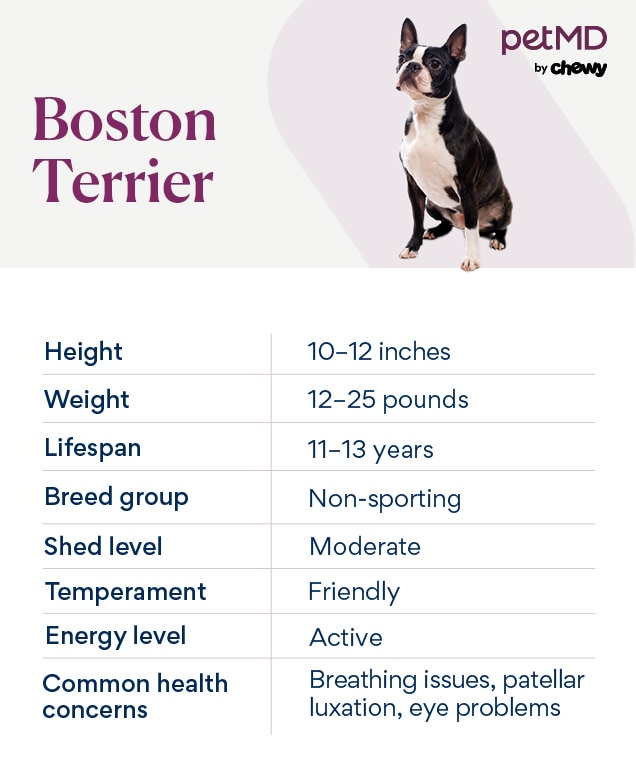
All Boston Terriers are brachycephalic dogs, meaning they have a flat nose, long palate, and narrow airway.
Because of their anatomy, they can experience breathing problems, especially if they overheat or exercise for too long. It’s important to keep exercise and play sessions to the mornings and evenings during the summer, as these dogs don’t do well in heat.
Small and stocky Boston Terriers are good family dogs and typically do well with children who play gently with them. But it’s important to always supervise children with dogs, especially Boston Terriers, because this playful breed can accidentally become injured during playtime.
Boston Terrier Health Issues
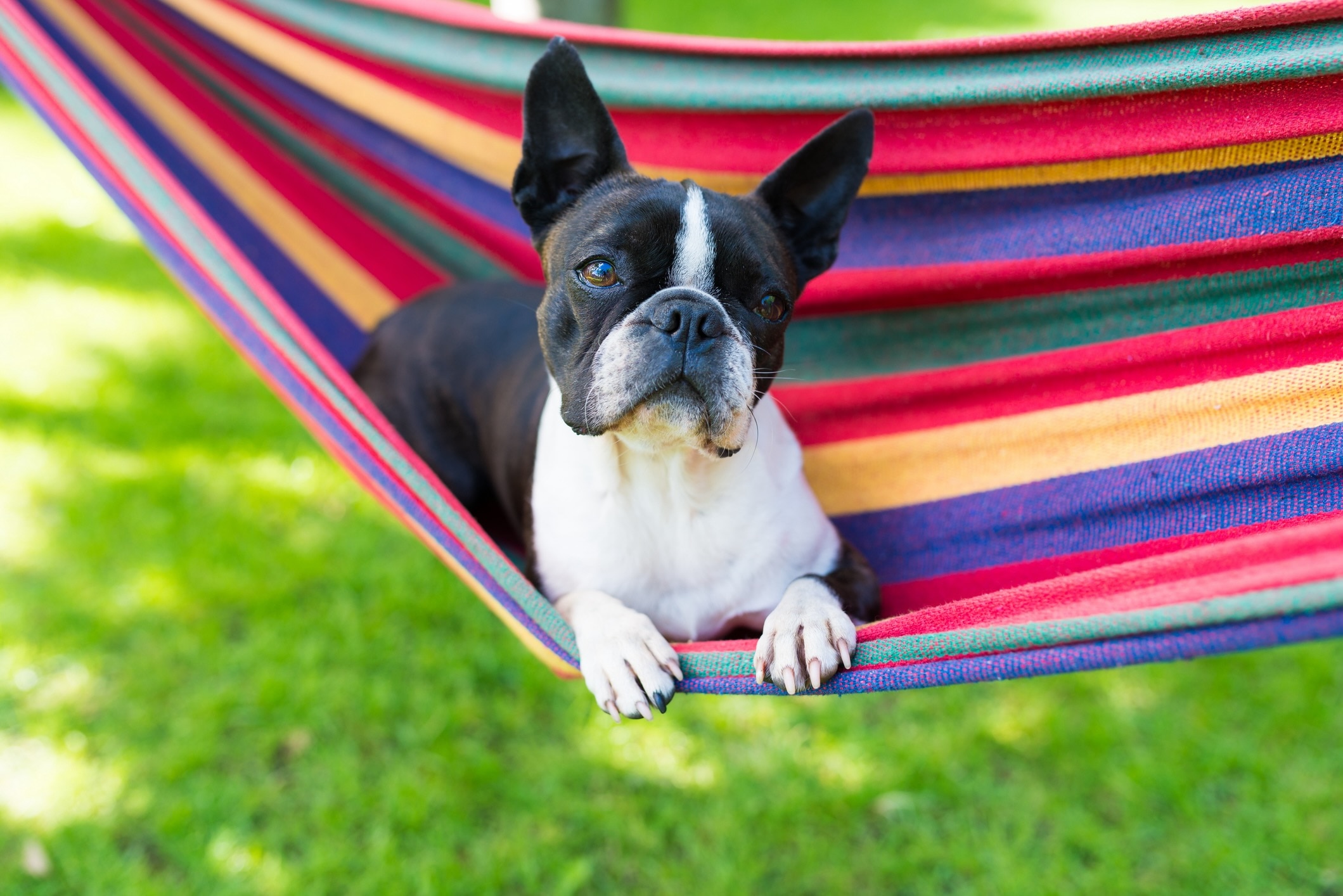
The average Boston Terrier lifespan is 11–13 years. However, Bostons are prone to health issues specific to their stature.
Knowing about the conditions they are predisposed to can help potential pet parents prepare for any health concerns that may arise. It’s also important to understand how you may need to adapt to an appropriate activity level and environment that will best suit a Boston Terrier dog.
Brachycephalic Syndrome
Like many flat-faced breeds, the Boston Terrier is considered brachycephalic and prone to upper-airway obstruction (brachycephalic airway syndrome), which can progress quickly into a life-threatening situation.
Boston Terriers have flat noses, short muzzles, and small nostrils, and tissues at the top of their throat can be enlarged. Combined, these anatomical issues result in:
-
Difficulty breathing
-
A reduced tolerance for exercise (especially in warm, humid weather)
Being overweight exacerbates these breathing problems, so it's important to keep your Boston Terrier trim and in shape.
Surgical correction of the airway can help make it easier for a flat-faced dog to breathe, so talk to your veterinarian about whether this is a good choice for your pup.
Patellar Luxation
Boston Terriers are prone to a condition called patellar luxation, which is caused by the kneecap (patella) wearing down and slipping out of place (luxating). Signs of this joint condition include a recurring limp, a bowlegged stance, and a popping noise from the knee joint.
Patellar luxation can lead to arthritis in dogs if untreated, and surgery may be needed depending on the condition’s severity.
As with brachycephalic airway syndrome, keeping your Boston Terrier at an ideal weight helps put less stress on the joints, thus lessening the symptoms of this condition. Also, providing your pet with joint support through a joint-healthy diet or joint supplements may be beneficial.
Eye Problems
Boston Terriers are predisposed to eye issues such as glaucoma, cataracts, dry eye, and corneal ulcers. Their eyes should be routinely checked by your veterinarian or whenever you notice any eye discomfort or changes.
Boston Terriers have big and bulgy eyes, so this breed may be more likely to experience eye injuries. It’s important to make sure your Boston Terrier dog plays safely and away from objects that could potentially hurt their eyes.
What To Feed a Boston Terrier
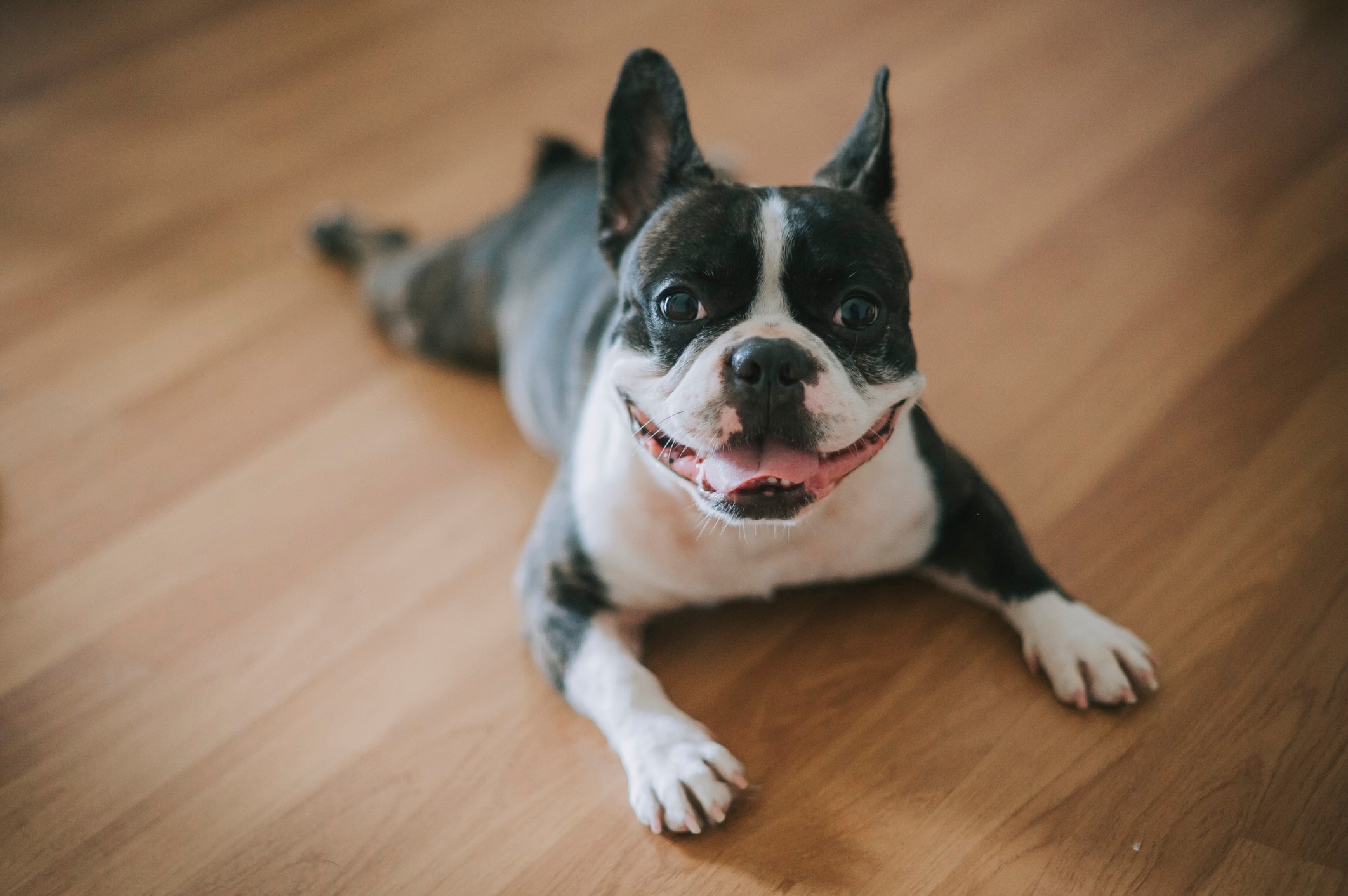
Boston Terriers need a high-quality and well-balanced diet formulated for their life stage (puppy, adult, or senior). Look for foods that meet the standards set by the Association of American Feed Control Officials (AAFCO).
Feeding your Boston Terrier a dry food intended for small breeds can make it easier for these little dogs to chew. Your veterinarian can help you choose the best food for your dog.
How To Feed a Boston Terrier
These dogs have a high metabolism and full-grown Boston Terriers should be fed two or three meals a day. Boston Terrier puppies may need to eat smaller meals more frequently throughout the day to prevent hypoglycemia (low blood sugar).
If your pup eats too quickly, consider a slow-feeder bowl to help your Boston Terrier pace themself during mealtimes.
How Much Should You Feed a Boston Terrier?
The amount you feed your Boston Terrier depends on the type and brand of food, along with the weight, age, health, and lifestyle of your dog. It's recommended that you ask your veterinarian about the appropriate amount. The dog food label also has recommendations based on these factors.
It’s important that Boston Terrier dogs stay at a healthy body condition score, as obesity can make their breathing problems worse. Work closely with your vet to ensure your dog is staying at a healthy weight, and adjust their diet accordingly.
Nutritional Tips for a Boston Terrier
Dogs that eat an AAFCO-approved diet will receive all necessary nutrients and won’t need anything extra. However, if your Boston Terrier develops a luxating patella or other health issue, your veterinarian may recommend a supplement for your dog.
Behavior and Training Tips for Boston Terriers
Boston Terrier Personality and Temperament
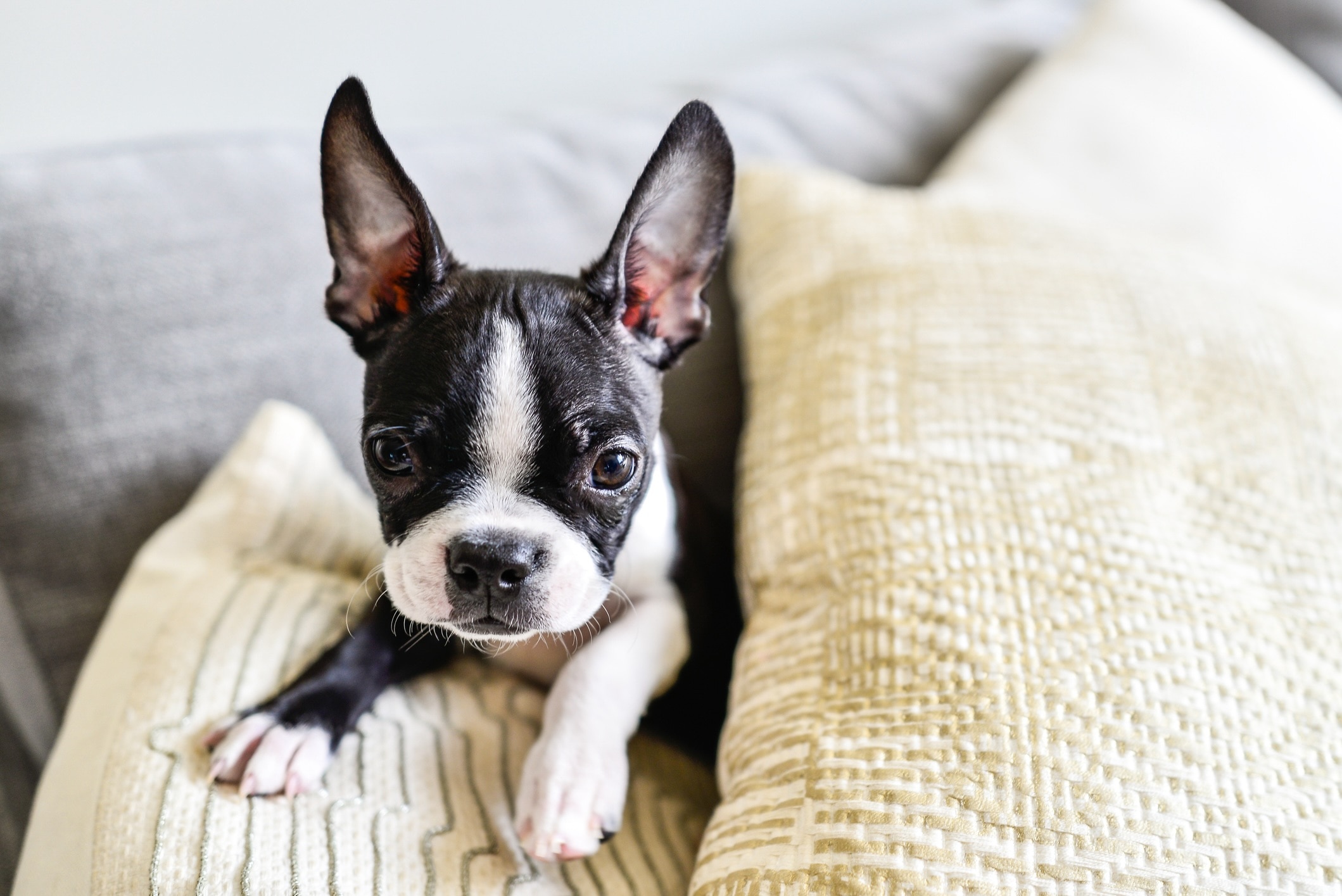
Boston Terriers are full of energy. They love playing with their family and entertaining anyone, and some of their favorite activities include fetch and Frisbee.
However, this high energy level needs to be managed in very hot and humid weather, as this can cause breathing difficulties.
Bred to be companion dogs, the typical Boston Terrier’s temperament is happy-go-lucky, and they usually do well in multi-pet households with proper training, socialization, and introductions. They usually do well with children too, with supervision.
Boston Terrier Behavior
Bostons do best with several short bursts of exercise throughout the day rather than, for example, one long morning walk. Schedule indoor or backyard playtime throughout the day, and make sure your pup receives enough mental stimulation.
Without enough exercise, attention, and mental stimulation, Boston Terriers can resort to undesirable behaviors such as excessive barking and chewing to keep themselves entertained.
Boston Terrier Training
Boston Terriers are smart dogs and respond quickly to positive reinforcement training. However, they may have a mind of their own during training sessions, so be patient, positive, and make training into a game to keep them engaged.
Like every dog, Boston Terrier puppies must be socialized from an early age so they can grow into confident adults. Talk to your Boston Terrier breeder about how they have approached socialization during your puppy’s early weeks of life and get advice on how to further socialize your pup from your veterinarian.
When leash training your puppy, a well-fitted harness is a better option than a collar because it reduces pressure on their trachea (windpipe) when walking. This can help reduce your Boston Terrier puppy’s potential breathing issues.
Fun Activities for Boston Terriers
Boston Terrier Grooming Guide
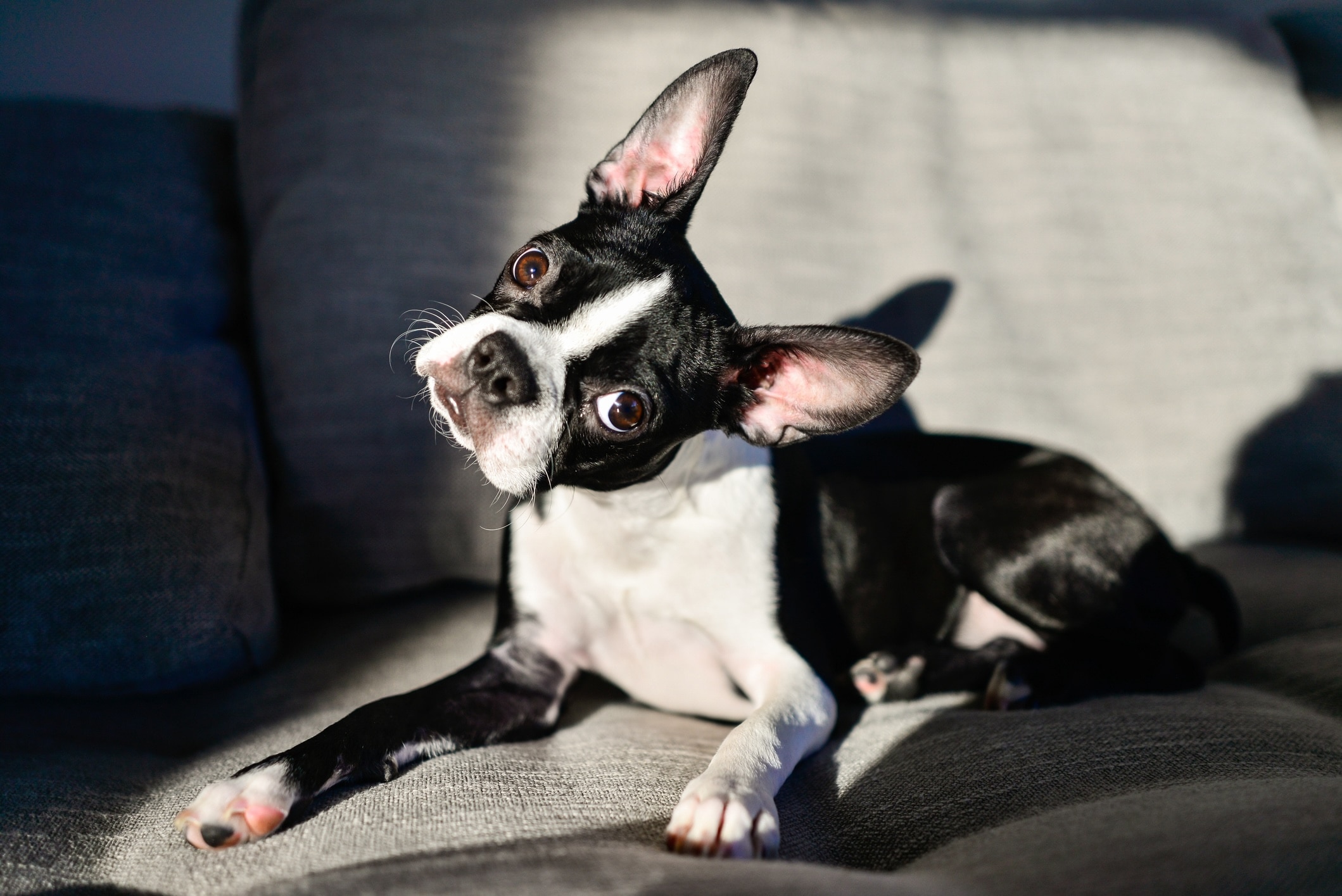
Black and white are the iconic Boston Terrier colors, and their tuxedo coat gives them their “gentleman” nickname. But Boston Terriers need regular grooming care to look their best.
Skin Care
Boston Terriers typically do not require any specific skin care. Ask your veterinarian how often you should bathe your dog, and contact them if you notice any changes in your Boston’s skin.
Coat Care
Boston Terriers have a short, smooth coat that sheds moderately. The Boston Terrier Club of America (BTCA) recommends brushing your dog at least once a week to reduce the amount of fur that ends up on your floor.
Their short coat also means Bostons can get cold easily, so they may benefit from a sweater or jacket in cold temperatures.
Eye Care
Boston Terriers are prone to eye disease and injury, so it’s important to regularly check their eyes for discharge, redness, or cloudiness.
Because dogs with bulging eyes, such as Bostons, can develop dry eye, using a lubricating eye gel or eye drops can help keep the eyes moist.
Ear Care
Regular ear cleaning is important for preventing ear infections in your Boston Terrier. Always use a veterinarian-recommended ear cleaner, and ask your vet how often you need to clean your dog’s ears.
Considerations for Pet Parents
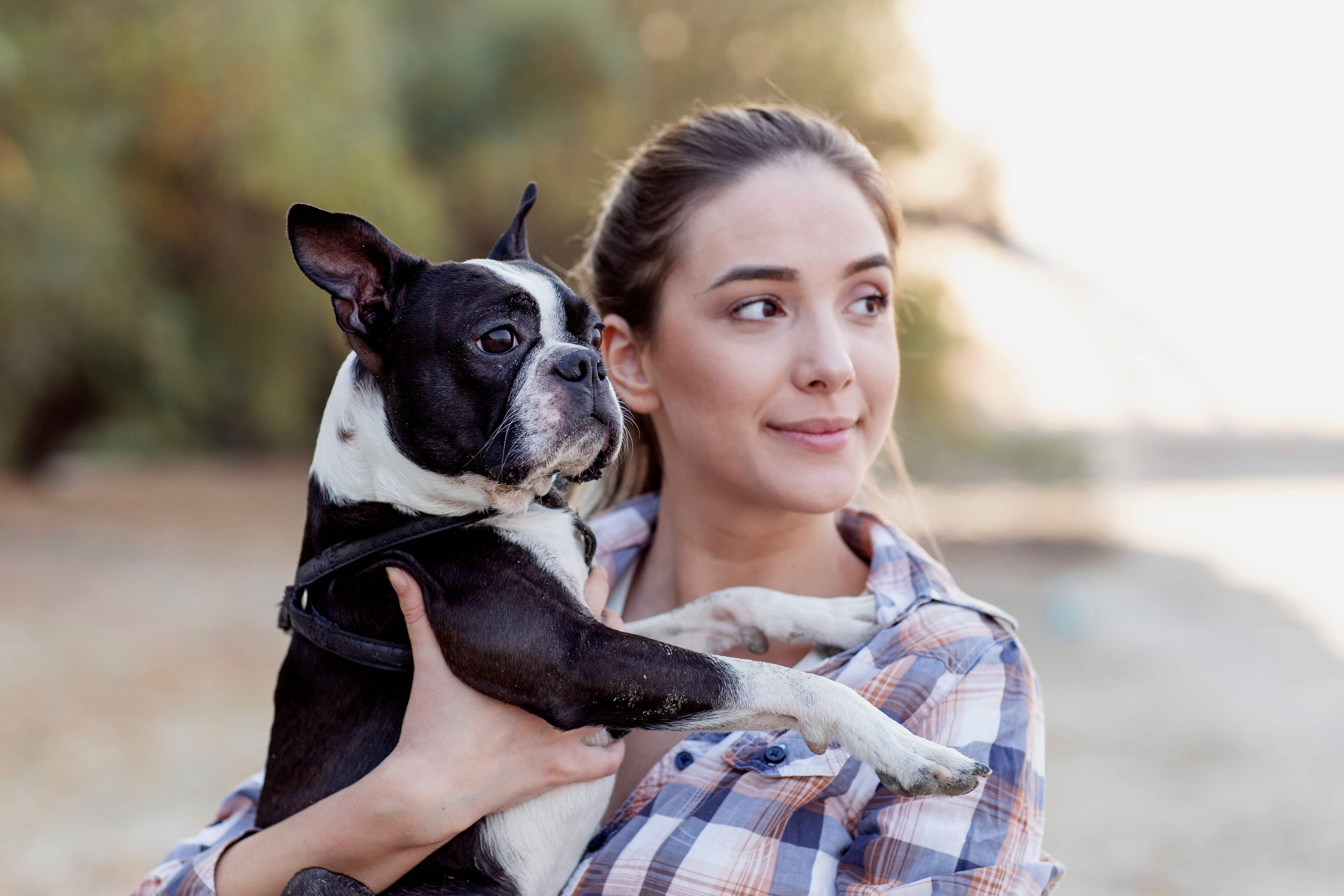
If you're thinking about adding a Boston Terrier puppy to your family, it's important to consider how you will manage their health—especially their breathing and joint problems. Purchasing pet insurance may be a good investment for Boston Terrier pet parents.
Also, it's important to think about the environment you can give a lively Boston Terrier. These are high-energy dogs who need some space to play and exercise. They can do well in apartments and other small homes thanks to their small size, but they will need to get regular exercise out of the house.
Boston Terrier FAQs
Is a Boston Terrier a good family dog?
Yes, with proper training Boston Terriers can be great, playful family dogs.
Are Boston Terriers smart dogs?
Yes, Boston Terriers are often very smart dogs.
How much does a Boston Terrier cost?
On average, you can expect to spend around $1,000 when purchasing a Boston Terrier puppy from a reputable breeder. The breed club has resources to help you find a Boston Terrier breeder.
You may also be able to find a Boston Terrier for adoption at shelters or breed-specific rescues.
Is a Boston Terrier a good house dog?
Yes. While they love to run, Boston Terriers often do well in an urban setting, provided they get enough exercise each day.
How long do Boston Terriers live?
The typical average lifespan of Boston Terrier dogs is between 11–13 years.
What are the differences between a Boston Terrier and a French Bulldog?
While these two breeds are quite similar, the Boston Terrier is a bit leaner, has pointier ears, and has a bit more energy than a French Bulldog.
